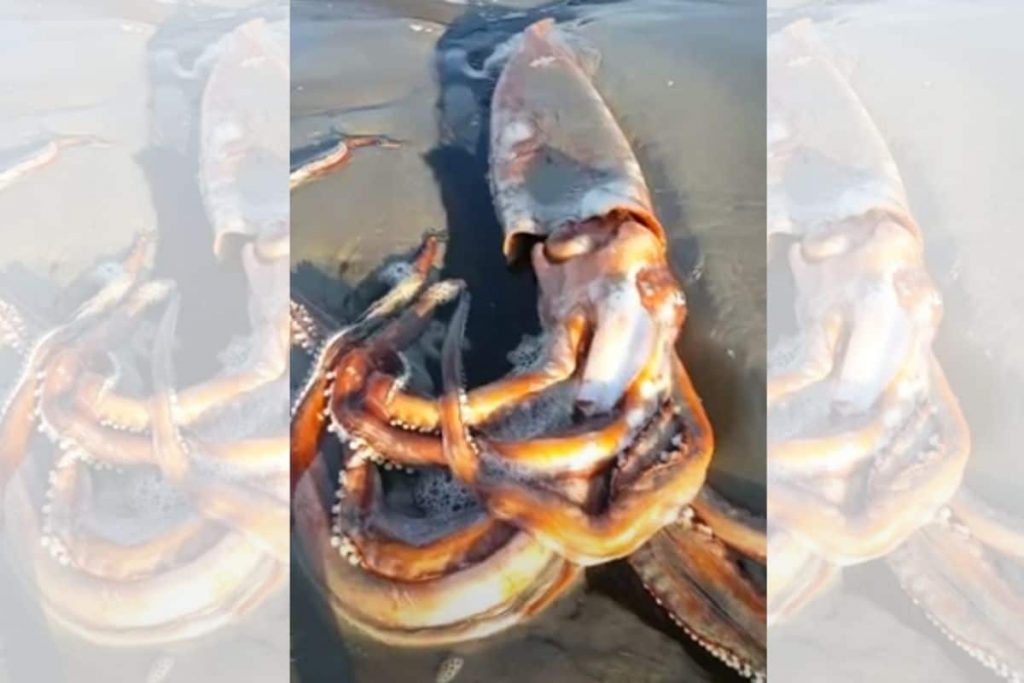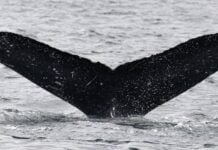That’s a rare occurrence indeed! Watch as a giant squid is found on a Western Cape beach.
The 4,20-meter (13,8-foot) long squid was discovered alive on June 7th, but those who found the squid were unfortunately unable to roll the squid back into the water.

A giant squid recently washed up on Britannia Bay Beach in the Western Cape on June 7, 2020.
It’s reported that the squid was still alive when it was found, and can be seen moving slightly at various points in the videos.
But according to reports, those who found the squid were unfortunately unable to roll the squid back into the water.
Richard Davies, who made the discovery on Sunday, June 7th, estimated that this giant squid weighed between 200 and 300 kilograms, and was measured to be 4,19 metres in length.
A rare sighting
This “discovery” was actually a very rare occurrence.
Giant squids remain largely a mystery to scientists despite being the biggest invertebrate on Earth. The largest of these elusive giants ever found measured 18 meters in length and weighed nearly 900 kilograms.
However, their inhospitable deep-sea habitat has made them uniquely difficult to study, and almost everything scientists know about them is from carcasses that have washed up on beaches or been hauled in by fishermen.
Lately, however, the fortunes of scientists studying these elusive creatures have begun to turn. In 2004 researchers in Japan took the first images ever of a live giant squid. And in late 2006, scientists with Japan’s National Science Museum caught and brought to the surface a live female giant squid.
Giant squid, along with their cousin, the colossal squid, have the largest eyes in the animal kingdom. These massive organs allow them to detect objects in the lightless depths where most other animals would see nothing.
Like other squid species, they have eight arms and two longer feeding tentacles that help them bring food to their beak-like mouths. Their diet likely consists of fish, shrimp, and other squids, and some suggest they might even attack and eat small whales.
But what do such findings imply?
When we pay attention to what is happening with the animals of the world, they can tell us a lot about our environment and predict changes that we, as mere humans, would normally not pick up on as quickly (or at all).
Like the canaries that were once used to detect toxic gas in coal mines, animals are sensitive to things that humans are often oblivious to (before it’s too late), and noticing those ‘things’ can sometimes mean the difference between life or death for large numbers of people.
Besides having senses that humans lack, animals also inhabit places that we don’t, like the oceans and the skies, places that border our living space and eventually impact it. So, what happens to them often happens to us a little later.
This 2014’s article reports many rare deep-sea crateure sightings made across the world within a few days in May:
And when we consider the ever-increasing number of events like these in recent years and the conditions surrounding them, along with all the reports of other marine die-offs and odd behavior, it doesn’t seem plausible that fishing accidents can account for all of the cases.
Death by natural causes, the Fukushima nuclear accident, and the BP oil spill disaster might also account for some incidents, though again, not likely all.
When we put all of the data together, it sounds like something very strange is going on down there in the deep.
Yes, the fact remains that there is a lot of hard evidence suggesting that, far from ‘global warming’, we’re already in the process of entering a new ice age (which could end up being a lot bigger than the last one).
This Earth change is accompanied by increasing cataclysmic activity such as major destructive storms, earthquakes, and volcanism, among other ‘anomalous’ goings-on all over the planet.
So no wonder the animals are behaving strangely. Maybe they’re trying to tell us something important. The question is, is anyone listening? More mysterious underwater phenomena on Strange Sounds and Steve Quayle. [TSA]













impending earthquake… Those deep-sea creatures feel it and then wash up on shores…